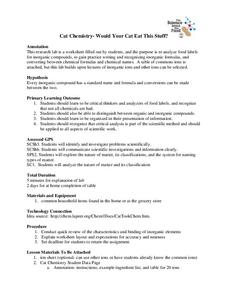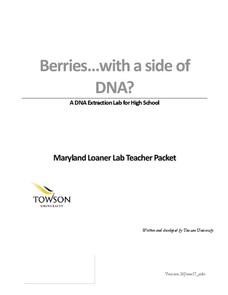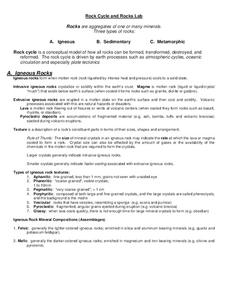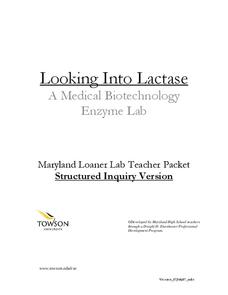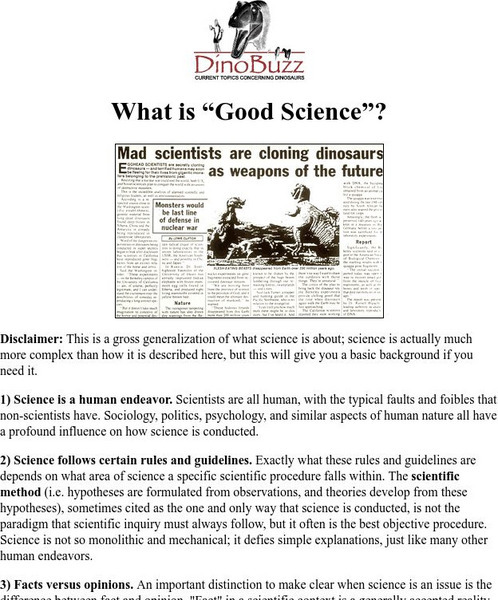Liberty High School
Science Department Lab Report Format
Make sure your scientists are reporting their work effectively by providing them with a reference for their lab reports. The first few pages of this resource detail each element of a lab report, and the last few pages provide an example...
Towson University
Mystery Tubes
How do scientists know they're right? Truth be told, they don't always know. Explore the scientific process using mystery tubes in an insightful activity. Young scientists discover how to approach and solve problems in science, how ideas...
University of Georgia
Would Your Cat Eat This Stuff?
Processed foods use inorganic compounds for flavoring and preservation. This take-home laboratory challenges scholars to find 20 different compounds identified on the labels of foods to list on their data collection sheet. The activity...
Towson University
The Wildlife Forensics Lab
Can science put an end to the poaching of endangered species? Show your young forensic experts how biotechnology can help save wildlife through an exciting electrophoresis lab. Grouped pupils analyze shark DNA to determine if it came...
Towson University
Berries...With a Side of DNA? (High School)
Is DNA still present after picking fruit or cooking vegetables? Biology scholars extract and collect DNA strands in an impactful lab. Working groups prepare their samples and compare their results to negative and positive standard...
Towson University
Looking Into Lactase: Guided Inquiry
Milk does a body good ... unless, of course, someone is lactose intolerant. Pupils play the role of pharmaceutical scientists in a guided inquiry lab about lactase. Lab groups collaborate to learn more about lactose intolerance, how...
University of New Orleans
Rock Cycle and Rocks Lab
Science rocks! Explore three types of rocks and the rock cycle with an igneous rocks experiment. Pupils discuss textures, composition, and learn how melts are formed from the Earth's crust. They weigh materials using a scientific scale...
National Institute of Open Schooling
Ionic Equilibrium
Scientific studies show the older we get, the more acidic we become. The activity extensively teaches high schoolers about acids and bases. By the end of the 14th installment of 36, they can define and explain three concepts of...
American Chemical Society
Joseph Priestley, Discoverer of Oxygen
Do you want to hear a joke about nitrogen and oxygen? NO. We all know there is oxygen in the air and that plants produce oxygen, but how was it discovered? Scholars read a handout, answer questions, and analyze material in the...
Towson University
Looking Into Lactase: Structured Inquiry
Why is lactase important? Biology scholars explore enzyme function in a structured inquiry lab. The activity tasks lab groups with observing how temperature and pH affect enzyme activity, as well as determining which milk products...
American Chemical Society
Isolation of Phytochrome
Why do soybean plants that are planted weeks apart in the spring mature simultaneously in the fall? Four independent activities cover the history of phytochrome research, scientist collaboration, the electromagnetic spectrum, and...
Teach Engineering
Where Are the Plastics Near Me? (Mapping the Data)
The last activity in a nine-part series has teams create a Google Earth map using the data they collected during a field trip. Using the map, groups analyze the results and make adjustments to the map to reflect their analysis. A short...
Deliberating in a Democracy
Cloning
Students explore the issues and challenges of cloning. For this cloning lesson plan, students read about how cloning affects people and the types of cloning, then they prepare a debate either for or against cloning.
Teach Engineering
Edible Rovers (High School)
Design and build a rover ... then eat it? This activity has groups of two design and build Mars rovers. The teams determine what instruments they want to include with their rover and plan a budget. They calculate the cost of the body of...
Teach Engineering
Edible Rovers
The good thing about building this rover is you get to eat it afterwards. Pairs determine rover parts they want to include in their design based upon their cost and usefulness. The teams design their rovers, build them from edible...
CK-12 Foundation
Ck 12: Earth Science: Scientific Community and Research Tools Study Guide
[Free Registration/Login may be required to access all resource tools.] Discusses the steps involved in presenting a hypothesis to the scientific community and what happens during and after peer review. Explains what a scientific model...
University of California
Ucmp: What Is "Good Science"?
A very good explanation of the scientific process and the differences between science and non-science. This is a concise and clearly written description.
University of Washington
Washington U: Model for Conducting Scientific Research
This page outlines the scientific method, step by step.
American Geosciences Institute
American Geosciences Institute: Science Fair Project
A complete guide to carrying out the most successful science fair project. Includes graphic organizers for planning.
University of California
University of California: Understanding Science: The K 2 Teachers' Lounge
A collection of teacher resources on the "how to" incorporate the nature and process of science into your curriculum. Site includes tips for the teacher, sample starting activities, teaching tools, and sample lessons.
University of California
University of California: Understanding Science: The 6 8 Teachers' Lounge
A collection of teacher resources on the "how to" incorporate the nature and process of science into your curriculum. Site includes tips for teacher, sample starting activities, teaching tools, and sample lessons.
University of California
University of California: Understanding Science: The 3 5 Teachers' Lounge
A collection of teacher resources on the "how to" incorporate the nature and process of science into your curriculum. The site includes tips for the teacher, sample starting activities, teaching tools, and sample lessons.
University of California
University of California: Understanding Science: The 9 12 Teachers' Lounge
A collection of teacher resources on the "how to" incorporate the nature and process of science into your curriculum. Site includes tips for the teacher, sample starting activities, teaching tools, and sample lessons.
University of Southern California
California State Science Fair: What Makes a Good Science Fair Project?
A good first step to read. This set of recommendations or advice comes from the California State Science Fair Committee. Read carefully the first three paragraphs and the "Students are advised" paragraph.


